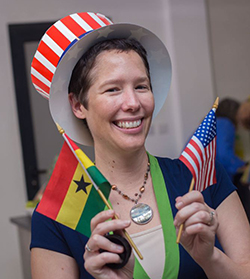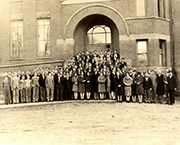Diplomacy: The Musical
BY SARA VELDHUIZEN STEALY ’98

SUBMITTED PHOTO
The Latvian National Opera house was packed to the rafters for the annual Latvian Music Awards, a major event in this song-loving Baltic country. Cameras swooped above the audience for the live broadcast. My colleagues and I huddled in the wings, awed and intimidated by this theatre that has hosted the world’s most talented singers, dancers and orchestras.
The music swelled and receded as the show returned from a commercial break. We heard the host begin musing, in Latvian, about rock ’n’ roll lyrics.
That was our cue.
The deputy chief of mission took a deep breath, and we leaned in for her pep talk: “Well, team, this is either going to be one of the best things we’ve ever done,” she paused, “or a complete disaster.”
We had spent eight months together in D.C. learning Latvian. In many countries, the U.S. Embassy is the only one in which diplomats are trained to speak the host country language prior to arrival. For anywhere from six to 24 months, learning the language is your only job: all day, every day. It’s a truly amazing aspect of U.S. diplomacy, but also a stressful one, knowing you must pass the proficiency test at the end. Everyone cries at least once. Or 37 times, but who’s counting?
At the end of every day, my classmates and I relieved our stress by translating a beloved Latvian folk song or snapping our way through a current pop hit. We learned the language, but the lyrics also taught us about Latvians themselves—their reverence for creation (the snow, the thick forests, the Baltic sea) and their deep emotions about their independence.
These artists were shaping our understanding of their country, and they didn’t even know it. We all agreed: When we arrived in Riga, we would host a party to say thank you. We kept our expectations low. Maybe all the artists would think it was corny. Maybe no one would care. Maybe no one would come.
They all came. Singers. Musicians. Actors. And the producer of the music awards, which is how six very nervous U.S. diplomats found themselves on that famed stage, armed with the trophy for Song of the Year and a song-and-dance routine that recapped our musical journey through the Latvian language. The ambassador began to speak.
“Pirms amerika¯nu diploma¯ti uzsa¯k savu dienestu cita¯ valsti¯, daudzi apgu¯st ta¯s valsts valodu Valsts departamenta A¯rlietu institu¯ta¯.” Before American diplomats begin their service in another country, many learn that country’s language at the State Department’s Foreign Service Institute.
The audience fell quiet.
Five minutes later, exuberant applause filled the venue. We earned the Latvians’ respect on that stage. Not with our skills. Heavens, no. When we hatched this plan, we somehow overlooked the fact that not one of us could sing. Or dance. But our efforts to embrace their language established a level of trust that buoyed our bilateral relationship for the remainder of our tours. As one Latvian exclaimed months later, “I remember you! I cried—such bad singing! But such good feeling.”
Over the years, my colleagues and I have worked on many issues dear to my heart. We’ve advised foreign legislatures on drafting stronger legislation against human trafficking and domestic violence. I’ve spent late nights on the phone with U.S. citizens, discouraging them from sending their savings to scammers posing as love-struck fiancees. We’ve helped craft natural disaster and terrorism simulations that improve our ability to coordinate with our host governments in crisis situations.
But sometimes our most important work is simply showing foreign audiences a side of America they haven’t seen before, a personal side: playing Ultimate Frisbee with local high school students, demonstrating the fine art of roasting s’mores, or just speaking their language.
Definitely just speaking. I’m leaving the singing to the professionals.
Sara Veldhuizen Stealy majored in theatre/speech and communications. She joined the State Department in 2008 and has served in the U.S. Embassies in Zambia, Latvia, Ghana and Lithuania and in the Bureau of Consular Affairs in Washington, D.C.
The views expressed are Stealy’s and not necessarily those of the Department of State or the U.S. government.
 Meet 10 alumni who are leading lives of significance. As they heal bodies and minds, spread the gospel and empathy, and fight human trafficking and pornography, they stand out.
Meet 10 alumni who are leading lives of significance. As they heal bodies and minds, spread the gospel and empathy, and fight human trafficking and pornography, they stand out. For 25 years, Northwestern athletes have been making Raider Magic in the Bultman Center. Here are some of the most memorable moments.
For 25 years, Northwestern athletes have been making Raider Magic in the Bultman Center. Here are some of the most memorable moments. High school psychology teacher Ali Ter Horst won $25,000 for inspiring students through innovative instruction, high expectations and vulnerability.
High school psychology teacher Ali Ter Horst won $25,000 for inspiring students through innovative instruction, high expectations and vulnerability. When Reformed Church leaders suggested in 1932 that Northwestern Junior College close temporarily, the Board of Trustees responded with an emphatic no.
When Reformed Church leaders suggested in 1932 that Northwestern Junior College close temporarily, the Board of Trustees responded with an emphatic no.
Classic Comments
All comments are moderated and need approval from the moderator before they are posted. Comments that include profanity, or personal attacks, or antisocial behavior such as "spamming" or other inappropriate comments or material will be removed from the site. We will take steps to block users who violate any of our terms of use. You are fully responsible for the content that you post. Comments posted do not reflect the views or values of Northwestern College.